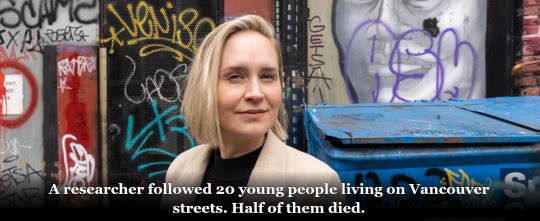#safe supply
Text
More than 400 safe supply supporters gathered in Vancouver's Downtown Eastside Friday to protest the recent arrests of the founders of the Drug User Liberation Front (DULF), which had been distributing a safe supply of illegal drugs in an effort to prevent overdose deaths.
Vancouver police raided the group's office and other addresses last week and arrested Eris Nyx and Jeremy Kalicum, saying the organization had publicly admitted trafficking illegal drugs.
The group's website says it provided 43 active participants up to 14 grams of substances that had been tested for safety — including cocaine, heroin and methamphetamine — each week, distributing a total of three kilograms of drugs "at cost."
"The climate to harm reduction and safe supply has been getting increasingly hostile over the years," said drug user activist and podcaster Garth Mullins on Friday as he walked with protesters down Hastings Street behind a banner calling for action on the toxic drug crisis.
Some protesters carried a cardboard coffin to represent the more than 13,000 people who have died of toxic drug poisonings since B.C. declared a public health emergency in 2016.
Continue Reading.
Tagging: @politicsofcanada
#safe supply#Drugs#Addiction#cdnpoli#canada#british columbia#canadian politics#canadian news#Vancouver
230 notes
·
View notes
Text
Voluntary Exclusion as part of drug regulation?
One objection to safe supply is that easy availability of drugs would be tempting to people in recovery who are endeavoring to remain abstinent from drugs. When someone is intent on abstaining long term, and they explicitly DON’T want easy access to a legal supply of drugs, then I’d like them (if possible) to have a voluntary opt-in blacklist system. Some casinos & some liqueur stores do this, in some locations.
This idea is called Voluntary Exclusion, and it is arguably a good idea for casinos and alcohol, and surely far superior to banning alcohol. If so, then it may be a good idea (& surely far superior to a ban) for other drugs as well.
Voluntary Exclusion may have problems, e.g. if it involves too little enforcement (losing its effect) or too much enforcement (causing other ethical problems). The Wikipedia article mainly discusses its use in casinos, and indicates it has run into enforcement/effectiveness problems (possibly due to bad design or bad incentives on the part of the casinos-- it's not clear how intractable these problems would be).
But it still seems like a Voluntary Exclusion system as part of a legal regulation of drugs is an idea that should be on the table. It could be one possible way to accommodate people who don't want easy access to drugs.
28 notes
·
View notes
Text
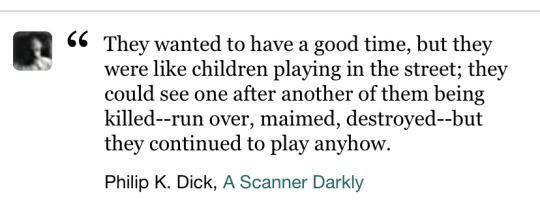
stumbled across this PKD quote about drug use and. fuck.
#a scanner darkly#phillip k dick#safe supply#harm reduction#drugs#bpd feels#od#overdose#sci fi novels#addict#addiction
40 notes
·
View notes
Text
Meanwhile in Canada…

Things like cigarettes are so villainized and taxed so high. Menthol cigarettes are even ILLEGAL. While in British Columbia narcotics are FREE and packaged nicely with warning labels for the homeless!
This Christmas a man sent all 87 B.C. MLAs magic mushrooms and politicians had the nerve to be angry. The same politicians who are mad about being gifted drugs are the same ones who allow organizations to freely dispense them!
We are living in clown world 🤡 so called “safe supply” will only lead to death and ruined lives.
#voteppc to oppose safe supply
#british columbia#bc#canada#cadpoli#bcpoli#ppc#people's party of canada#canada first#drugs#safe supply#dulf#meth#cocaine#heroin#death#genocide#mla#cigarette#menthol#voteppc
2 notes
·
View notes
Text
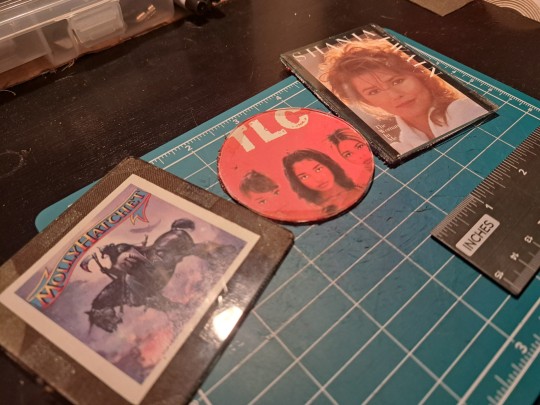
I also dabble in paraphernalia. Here's a few of my powder plates. Harm Reduction and Safe Supply being my inspiration. A lot of us have lost someone. Carry Naloxeone if you can and take a course in first aid. Or at the very least verse yourself in the basics. Chest compressions, etc.
#diy punk#diy or die#punk aesthetic#artists on tumblr#punk#paraphernalia#dope#harm reduction#safe supply#punk rock#diy
1 note
·
View note
Text
News from Nanaimo, BC, Canada and beyond, 23 June.
BC Ferries has launched its summer schedule with additional sailings and staff, but warns customers of possible cancellations due to crew shortages.
The company has added more than 1,200 staff in the past year, but is still facing a shortage of professional mariners and backup crews in key positions.
Customers are advised to book in advance, consider off peak travel times, and check the company's website or app for up-to-date information on ferry schedules and conditions.
2. The Tom Harris Charity Classic, an annual golf tournament, raises money for local nonprofits in Nanaimo, British Columbia.
3. Jessica Michalofsky, who lost her son to toxic drugs, is running across the province to raise awareness and support for safe supply.
In May 2021, 176 people lost their lives in B.C. due to toxic drugs, highlighting the urgent need for action to address the overdose crisis.
4. Woodgrove Chrysler donated $10,000 to Loaves and Fishes food bank, which was matched by Island Savings for a total contribution of $20,000.
The donation will support the Nanaimo Loaves and Fishes Community Food Bank's Food 4 Summer program, which aims to provide food security during the summer months.
The Food 4 Summer program was created to raise awareness about the year-round need for secure access to food, as donations tend to drop significantly during the summer.
5. The Women of Influence Awards is launching in Nanaimo to celebrate and elevate gender equity by recognizing individuals who bring value to their community.
The event aims to create a platform for diversity and inclusion that involves education, normalization, acceptance, and celebration.
The awards gala will feature 10 categories, including one open to anyone who supports the advancement of others and campaigns for diversity and inclusion, and will be held a week before Sexual and Reproductive Health Awareness Week.
6. Parts of the Titan submersible were found off the coast of Newfoundland in eastern Canada, scattered across the floor of the Atlantic Ocean, likely due to an implosion.
#ferry#sailings#boats#golf#safe supply#toxic#drugs#running#Loaves and Fishes#food#donations#inclusion#diversity#awards#Nanaimo#BC#Canada
0 notes
Text
Local reaction to the relaxation of the heroin/cocaine drug laws in Vancouver
This report appeared in the Daily Telegraph, London, on 1st February 2023:
So I asked Anna Smith, this blog’s occasional Canadian correspondent, based in Vancouver, about the effect of the new laws…
Hi John,
Sorry for late reply, I was working amongst the masses… I have been helping revive overdose victims several times a week.
Sunrise in Vancouver… and an ambulance takes another drug patient…
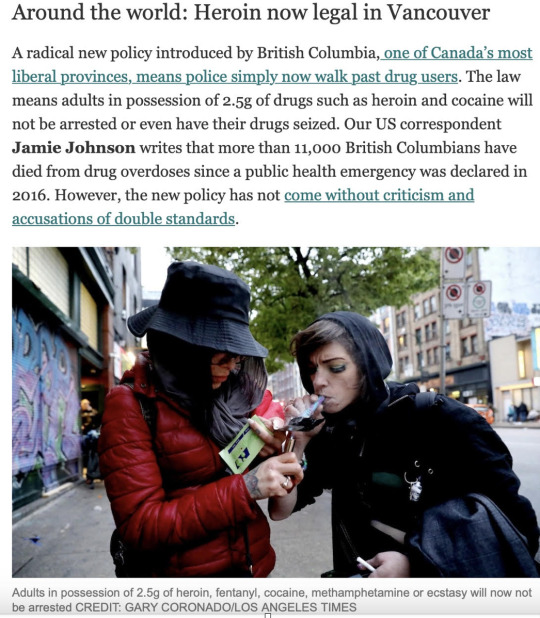
View On WordPress
#Anna Smith#benzodiazepine#British Columbia#Canada#cocaine#drugs#fentanyl#heroin#laws#Methamphetamine#police#safe supply#Vancouver
1 note
·
View note
Text
Vancouver police have arrested drug policy activists Eris Nyx and Jeremy Kalicum after executing search warrants on the Drug User Liberation Front office and their homes.
Since 2020, Nyx and Kalicum have held protest events and operated a compassion club to supply tested heroin, cocaine and meth to drug users, despite the risk of arrest for breaking Canada’s controlled substances laws.
Nyx and Kalicum said they were driven to break drug laws through firsthand experience of the overdose crisis. Nyx has spoken about losing dozens of friends to the overdose crisis, while Kalicum previously told Vancouver city council about reversing over 100 overdoses when he worked in the Downtown Eastside.
Full article
Tagging: @politicsofcanada
#cdnpoli#canada#canadian politics#canadian news#canadian#safe supply#DULF#drug user liberation front#british columbia#BC#vancouver#drugs#drugs tw
69 notes
·
View notes
Text
Against "More Housing & Jobs" as an anti-drug-legalization argument
I claim only drug legalization can drastically and quickly reduce overdose deaths in North America, because only legalization can replace the volatile black market mystery-powder with a consistent supply of known potency and composition. (Here I’m using “legalization” as an umbrella term which encompasses safe supply.)
One of the most pernicious objections to drug legalization is this: “Instead of legalization, we should invest massively in housing and job programs.” Or "Instead of providing marginalized people with more drugs, we should give them services so they won't want drugs anymore."
This is a close cousin to the argument “Instead of legalization, we should invest massively in addiction treatment” which I’ve complained about a lot before, and it is unsound and pernicious for similar reasons.
This objection is pernicious for many reasons. One reason is that it *pretends* to be progressive, but really it is a conservative authoritarian defense of the failed war on drugs. Anti-drug-user conservatives cynically make this argument to fool ill-informed progressives into opposing legalization on pseudo-progressive grounds. It's a grotesque abuse of progressive values, and tends to be dishonest.
These conservatives tend to actively oppose investment in housing and job programs. Even when they aren't outright hostile, they insist that housing and job programs should actively discriminate against people who use drugs, especially against addicted people who are at highest risk.
By contrast, pro-drug-legalization progressives and harm reductionists are among the staunchest supporters of massive investment in housing and job programs, and against anti-drug-user discrimination within these programs. For instance, there are close ties between the harm reduction movement and the low-barrier housing/housing-first movement. Harm reduction and safe supply programs are often accompanied by services to assist drug users to get or maintain jobs and housing.
Moreover, the objection is fundamentally a distraction aimed at shutting down critical thought. It insinuates that drug legalization is somehow at odds with housing and job programs—but gives zero explanation as to how or why there would be any conflict between the two. They don't want you to ask these questions or flesh out the structure of the argument. It's a thought-stopper. The argument is aimed at people who won't scrutinize it.
(Note: Later, I will come back to a steelmanned argument that suggests there could be a more subtle conflict between jobs/housing and legalization-- but conservatives don't and can't actually make the more subtle argument.)
Housing & Jobs ARE good and probably reduce addiction -- but here are four reasons this does NOT justify the anti-legalization view
Of course, one can very reasonably argue that housing and job programs would reduce addiction (and/or the worst symptoms of addiction) greatly--perhaps rendering legalization unnecessary. Indeed I claim we should invest in housing and job programs—in part to reduce addiction and overdose, and in part for many other reasons. But construed as an anti-legalization argument in particular, this argument is severely flawed on at least four grounds (in addition to the fact that there simply is no actual contradiction between jobs/housing and legalization, as I noted).
One, it is empirically unclear how much housing and job programs would reduce addictions that already exist, and there is a serious risk of overstating the case --including by legit progressive advocates of housing and job programs, who arguably sometimes exaggerate how much housing-first programs reduce addiction and/or overdose.
Two, regarding jobs: Many people with severe drug addictions are presently unable to hold a job (or there are very few jobs they can hold). This somewhat limits the scope of jobs as a solution for presently addicted people, at least for now. Overdoses are disproportionately very common among people who don't have jobs-- but I'm not sure of the causal directions (probably there are multiple causal directions), and it isn't clear how many of them could have their overdose risk much reduced by job programs in particular (even for the subset of them who can hold jobs, let alone those who cannot).
Three, housing and job programs can’t reduce addictions quickly, but rather (at best) quite slowly-- by (1) slowly preventing the acquisition of new addictions among a new cohort of would-be addicted people, and (2) by slowly helping treat addictions among a subset of presently-addicted people. And in the meantime, hundreds of thousands of addicted drug users will continue dying. Only legalization can quickly reduce overdoses.
Some people attack legalization as short-term oriented—but I think we SHOULD be short-term oriented in this way, since so many thousands of people are dying right NOW.
Four, housing and job programs won’t likely do much to reduce overdoses among non-addicted drug users who still use the unregulated drug market. Non-addicted drug users almost surely constitute a minority of overdose deaths, but still a lot of people in total. And non-addicted drug users are also the large majority of total people who use drugs. (I'm here assuming the "addiction" conceptual-theoretical framework is more-or-less legit-- although this is far from uncontroversial.)
The "Housing & Jobs" anti-legalization argument is probably unsound or flawed in other ways too, but that's what I can think of offhand. Admittedly I'm being very hand-wavey about the specifics. Lots of empirical research by experts would be needed to flesh out the analysis more concretely.
The Realpolitik Variant of the Argument
Finally, is there a better possible variant of the argument? Maybe. One could potentially argue that drug legalization would be good if attained-- but that we should strategically abstain from advocating for it, or that we should make it low-priority, because of the limitations in government funding and/or political capital. We can only pragmatically advocate for so many things at one time, so perhaps we should sacrifice legalization for the sake of gains in jobs and housing? These sorts of reasons could create a real conflict between jobs/housing and legalization.
(Relatedly, one could also worry that legalization may create conservative backlash (which decriminalization has arguably caused in British Columbia and Oregon), or that it may problematically empower for-profit drug corporations and/or right-libertarians, in such a way as to strengthen longterm opposition to progressive advocacy for jobs and housing.)
At the risk of misusing terminology, I will tentatively call this the realpolitik argument against legalization advocacy. Perhaps the realpolitik argument has serious weight in countries that don't have an ongoing severe overdose crisis, outside North America. However, I think the realpolitik argument would probably also be unsound, at least in North America-- if indeed I'm right that only legalization can save hundreds of thousands of people's lives. I do not believe there are strong enough realpolitik considerations, with a high enough probability, to outweigh the value of such massive-scale life-saving (even if we discount for the fact that there is some probability that I am mistaken about legalization's effects).
In any case, conservatives do not make this argument, and indeed cannot legitimately make this argument—since conservatives are the ones mainly responsible for opposing progressive goals and creating the aforementioned limitations on government funding and political capital, in the first place.
#drugs#drug policy#war on drugs#social justice#legalization#safe supply#harm reduction#opioids#addiction#overdose
12 notes
·
View notes
Text
"Safe supply is off the table"
This two-part interview with the Alberta premier chief of staff on the difference in drug policy between B.C. and Alta. is quite something.
Part one: "I’m quick to say it’s the lived experience of people in recovery who are guiding that advice in Alberta, versus in B.C. where it is the living experience of people who are in addiction who are guiding the policy conversation in B.C."
Part two: "Safe supply is off the table"
Also:
That is in contrast to British Columbia where their express goal is literally to hand it out. Their goal in British Columbia is to replace the illicit drug supply with a pharmaceutical drug supply. They want these things flooded onto the streets. They will say [that’s not the case]. I have documentation that proves otherwise.
This is probably news to all the people in B.C. unable to access safe supply
0 notes
Text
People who use drugs deserve love and kindness.
Abstinence is not the only form of recovery. AA/NA doesn’t work for everyone. Sometimes people choose to use instead of meeting other needs, which is valid. Some people use for recreational purposes. Some people use for medicinal purposes. Some people who use have substance abuse disorder. Treatment looks different for everyone. Not everyone needs or wants treatment, for various reasons. The only thing Naloxone enables is breathing. Active use is not shameful. People who use drugs often also deal drugs. People in recovery should not shame active users. Active users deserve love. Active users deserve someone to check in on them, get them safer use supplies, and get them pizza. Active users deserve to be listened to. They deserve better than to have that be the first time anyone ever treated them as human since they began using.
Let’s care for each other.
#chronically couchbound#tw drugs#recovery#narcan#naloxone#harm reduction#harm redux#drug usage#addiction#active users#people in recovery#harm reduction saves lives#naloxone enables breathing#abstinence#alcoholism#substance use#substance addiction#safe use#safe use supplies#harm reduction is mutual aid#mutual aid#community care#narcan saves lives#AA/NA#narcotics anonymous#alcoholics anonymous
3K notes
·
View notes
Text
Femme Fatale Guide: Purse Essentials For Day & Night (or Any Activity In Between)
Daytime Handbag Essentials:
Keys
Wallet/cardholder (ID[s], credit/debit cards, spare cash – enough for an emergency cab/train ticket, a bottle of water, and a cheap snack plus a little extra is my formula)
Phone/phone charger
Airpods/headphones
Mini sunscreen
Hand lotion
Floss picks in a travel floss dispenser
Mini disposable toothbrushes
Breath mints
Portable stain remover wipes
Hand sanitizer
Lip balm/your everyday lip color
Eyeliner
Brow pencil
Power foundation
Contour/blush stick
Oil blotting sheets
Roll-on perfume
Hair ties
Foldable mini hair brush
Feminine hygiene wipes
Panty liners/pads/tampons
Travel case bandaids
Condoms (not in a wallet, please)
A pen or two
Portable sticky notes
Travel pack of tissues
Spare glasses/contacts & contact solution
Sunglasses
OTC pain relief medicine
Water bottle
Non-perishable snacks (I recommend Larabars, Lupini beans/roasted chickpeas/edamame, roasted nuts/trail mix snack packs, Lupii/Raw Rev vegan protein bars, and freeze-dried fruit)
Nighttime Handbag Essentials:
Keys
Wallet/cardholder (ID[s], credit/debit cards, spare cash – enough for an emergency cab/train ticket, a bottle of water, and a cheap snack plus a little extra is my formula)
Phone/portable phone charger
Mini sunscreen
Hand lotion
Floss picks in a travel floss dispenser
Mini disposable toothbrushes
Breath mints
Portable stain remover wipes
Hand sanitizer
Lip balm/your everyday lip color
Eyeliner
Brow pencil
Mini power foundation
Roll-on perfume
Hair ties
Foldable mini hair brush
Feminine hygiene wipes
Panty liner (and maybe a pad/tampon, depending on the time of the month)
Portable makeup remover wipe (or two)
Portable cleansing towelette (or two)
Travel case bandaids
Condoms (at least two – not in a wallet, please)
Disposable foot socks
OTC pain relief medicine
Vitamin B-complex, Vitamin C, and Vitamin D supplement (one of each – for after or the morning after drinking)
Necessary Edit: This list is meant to be a comprehensive guide, designed to be personalized. If you don't think you need some of these items, [pick and choose at your discretion].
#girl tips#girl talk#feminine hygiene#office supplies#makeup essentials#skincare products#beauty products#health and wellness#healthy snack#perfume#haircare#safe sex#pain relief#sun protection#eyecare#morning after#skincareproducts#femme fatale#dark femininity#dark feminine energy#it girl#high value woman#the feminine urge#high value mindset#female excellence#dream girl#queen energy#female power#glow up tips#femmefatalevibe
1K notes
·
View notes
Text
hey btw narcissists are so pretty and deserve to do whatever they want all the time because they're a joy to be around. the world would be so sad and awful without them.

^me petting all my fellow narcissists because I love you
#narcangel speaks#narcangel love#npd positivity#npd supply#npd love#actually npd#npd#npd safe#narcissist supply#actually narcissistic#narcissistic personality disorder#narcblr#narc supply#cluster b safe#actually cluster b#cluster b positivity#cluster b personality disorder#cluster b
202 notes
·
View notes
Text
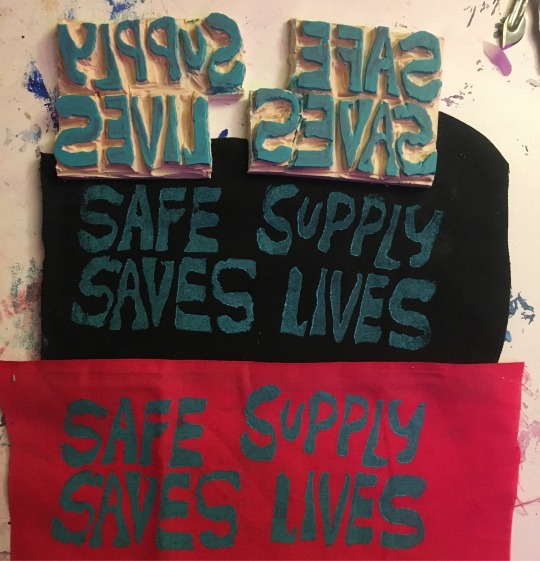
Safe supply saves lives linocut patch i carved today!
#punk#diy#patches#linocut patch#linocut print#carving#diy patches#diy punk#save supply#safe supply saves lives#my patches#harm reduction#harm redux
301 notes
·
View notes
Text
People with npd (or questioning): tell us what you think you’re good at! Tell us an accomplishment you feel proud of! It can be as little as getting dressed in the morning or finding earrings you really love, or doing a doodle or being good at reading animal behavior.
#npd positivity#narc supply#actually narcissistic#actually npd#npdposting#narcissism positivity#npd safe#narc safe
101 notes
·
View notes
